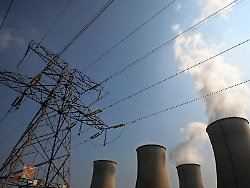Wednesday, January 05, 2022
Operation is no longer worthwhile
Energy price shock causes industry to tremble
In wholesale the prices for electricity and gas have multiplied. More and more industrial companies and consumers are feeling this too. Some gas suppliers have already gone bankrupt. The SME Association is therefore calling for an energy summit with the federal government.
German SMEs are sounding the alarm because of the skyrocketing prices for electricity and gas. The managing director of the Federal Association of Medium-Sized Enterprises, Markus Jerger, spoke of a threat to “growth, employment and the prosperity that has been built up over decades” and called for an energy summit to be convened. As the “Handelsblatt” reports, the first companies have already stopped their production in Germany because it is no longer profitable due to rising energy costs.
Energy-intensive sectors such as the chemical industry, steel and aluminum works or paper manufacturers are affected. “We have decided to completely shut down a production line at our production site in Freital. This will apply for an indefinite period of time,” the “Handelsblatt” quotes the managing director of Glashütte Freital, Stefan Jugel. “On the basis of the current energy costs, the production makes no sense. The energy costs are higher than the sales,” said Jugel.
The first energy-intensive factories in Great Britain had already ceased operations months ago, including fertilizer manufacturers. Such interruptions in production indirectly affect other sectors of the economy and consumers. The scarcity of fertilizers is already having an impact on global food prices. The production of many building materials, the price of which had already risen sharply last year, also requires large amounts of energy.
In Germany, the price of gas, which is used in many industrial companies for heat generation as well as electricity generation and heating for private households, literally exploded in the second half of 2021. The Dutch gas futures contracts, which serve as a benchmark for the European gas market, rose more than tenfold over the course of the year. At the turn of the year, prices collapsed by more than half at times. However, they are still many times higher than the long-term price level.
Eon boss predicts bankruptcy for dubious gas suppliers
This price increase has become a problem for many energy suppliers who have agreed long-term stable prices with their customers without hedging themselves accordingly. Recently, various energy providers in Germany had run into financial difficulties due to the sharp rise in energy prices. This does not only apply to the gas market. For example, several electricity providers have had to file for bankruptcy in the past few months. This in turn leads to price shocks for private consumers and companies, which as a rule continue to be supplied by the regional basic supplier, but mostly at much higher prices.
“Some companies have difficulties in getting gas supply contracts for January or February that enable production to cover costs. This could endanger production in individual cases,” said Christoph René Holler, managing director of the Federal Association of the Ceramic Industry, the “Handelsblatt”.
The situation could worsen despite the recent fall in stock exchange prices for energy sources. Dozens of gas companies are likely to disappear in Germany in the long run, Eon boss Leonhard Birnbaum recently told the “Rheinische Post”. Birnbaum welcomed this as a market shakeout: “It’s not a shame about the unsound speculators who leave customers out in the rain and look for the distance”. The Eon boss also warned of bottlenecks. Worldwide demand after the Corona recession has picked up, Germany has gone into winter with below-average gas storage facilities, and there are also political uncertainties. “If the winter gets very cold now, we could have unpleasant surprises.” But he ruled out that houses would have to stay cold because of this: “Of course, households will continue to be heated,” he told the “Rheinische Post”. “It won’t get cold, but it will be more expensive for the citizens.”
Price jumps as a “fire accelerator”
Markus Jerger sees it as the federal government’s duty to work with industry to find viable solutions to the problem of the dwindling competitiveness of energy-intensive industries. “Small and medium-sized enterprises expect effective measures from such an energy summit to contain costs and thus to secure the competitiveness of our companies.”
Jerger referred to a current business survey conducted by the association. More than 90 percent of medium-sized companies anticipated that the prices for energy will continue to rise in the future. “At the same time, more than 50 percent feel they are unable to shoulder the skyrocketing energy prices.” The price jumps on the electricity exchanges acted like a fire accelerator for the energy costs of the manufacturing companies.
A first step is to lower the electricity tax to the European average. The new federal government had announced that the financing of the EEG surcharge through the electricity price should end on January 1, 2023. However, this helps electricity-intensive companies less than private consumers, because they only have to pay a reduced EEG surcharge.
